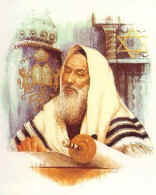Articles on Messianic Prophecy

Do the rabbinic writings speak of a "Suffering Messiah?"
Written by Mitch Glaser T he answer to this
question is a resounding -"Yes!" Where do
the early rabbis draw their material from?
From the Jewish Scriptures! Two primary
Scriptures that the rabbis draw upon in their writings on
the Suffering Messiah are Psalm 22 and Isaiah 53.
Pesikta Rabbati, which Jewish scholars date to the
sixth or seventh century C.E., is a rabbinic document on
the festivals of Israel. It speaks of a suffering Messiah in
this way:
T he answer to this
question is a resounding -"Yes!" Where do
the early rabbis draw their material from?
From the Jewish Scriptures! Two primary
Scriptures that the rabbis draw upon in their writings on
the Suffering Messiah are Psalm 22 and Isaiah 53.
Pesikta Rabbati, which Jewish scholars date to the
sixth or seventh century C.E., is a rabbinic document on
the festivals of Israel. It speaks of a suffering Messiah in
this way:
[When He created the Messiah,] the Holy One, blessed be He, began to tell him the conditions [of his future mission], and said to him: 'Those who are hidden with you [your generation], their sins will in the future force you into an iron yoke...and because of their sin your tongue will cleave to the roof of your mouth.' [Psalm 22:25] Do you accept this? The Messiah said...'Master of the worlds! With gladness in my soul and with joy in my heart I accept it, so that not a single one of Israel should perish; and not only those who will be alive should be saved in my days, but even the dead who have died from the days of Adam the first man until now.'1
The Midrash Aseret Memrot states that Messiah will be made a trespass offering:

The Rabbis' Dilemma: A Look at Isaiah 53
Written by Rachmiel Frydland T he subject was never discussed in my pre-war-Poland Hebrew school. In the rabbinical training I had received, the fifty-third chapter of the book of Isaiah had been continually avoided in favor of other, "weightier" matters to be learned. Yet, when I first read this passage, my mind was filled with questions:
Behold, my servant shall prosper, he shall be exalted, and extolled, and be very high. As many were astonished at thee; his visage was so marred more than any man, and his form more than the sons of men: So shall he sprinkle many nations; the kings shall shut their mouths at him: for that which had not been told them shall they see; and that which they had not heard shall they consider.
Who would have believed our report ?...
T he subject was never discussed in my pre-war-Poland Hebrew school. In the rabbinical training I had received, the fifty-third chapter of the book of Isaiah had been continually avoided in favor of other, "weightier" matters to be learned. Yet, when I first read this passage, my mind was filled with questions:
Behold, my servant shall prosper, he shall be exalted, and extolled, and be very high. As many were astonished at thee; his visage was so marred more than any man, and his form more than the sons of men: So shall he sprinkle many nations; the kings shall shut their mouths at him: for that which had not been told them shall they see; and that which they had not heard shall they consider.
Who would have believed our report ?...
Historic Jewish Messianic Interpretations of Isaiah 53
It's commonly maintained that Isaiah 53 was never considered messianic by rabbis and Jewish sages. Sometimes the statement is phrased as, "Judaism teaches" that Isaiah 53 refers to the nation of Israel.
The fact is that Isaiah 53 (more precisely, 52:13 to 53:12) has been interpreted in messianic terms by a wide variety of Jewish commentators over a long period of time. Other interpretations have certainly been offered, including the view first popularized by Rashi in medieval times that the prophet speaks of the nation of Israel. Neverthless the messianic interpretation has a long history in Jewish Bible exegesis, as shown by the quotations below.....

Jewish Messianic Interpretations of Zechariah 12:10
Some say that Zechariah 12:10 refers to the Gentile nations who mourn because of the Jewish martyrs (or a particular unknown martyr) they have killed.
Yet that is not the universal Jewish understanding. According to the views of some rabbis, two Messiahs would make their appearance: Messiah ben Joseph who would be slain in battle, followed by Messiah ben David who reigns as the victorious king. Any number of Jewish sources therefore refer this verse to the slaying of the Messiah ben Joseph. At least one commentator believes that the Messiah ben Joseph dies as an atonement for the sins of Israel. Some Jewish sources which take a messianic interpretation of Zechariah 12:10 are as follows:

Is Psalm 2 considered Messianic by the Rabbis and Jewish sages?
Though some say that Psalm 2 is not considered messianic by the rabbis or Jewish sages, the Jewish messianic understanding of Psalm 2 has a long history. Some of the rabbinic sources which take a messianic interpretation of Zechariah 12:10 are as follows:Babylonian Talmud, Sukkah 52a
Our Rabbis taught, The Holy One, blessed be He, will say to the Messiah, the son of David (May he reveal himself speedily in our days!), 'Ask of me anything, and I will give it to thee', as it is said, I will tell of the decree etc. this day have I begotten thee, ask of me and I will give the nations for thy inheritance [Psalms 2:7-8].
